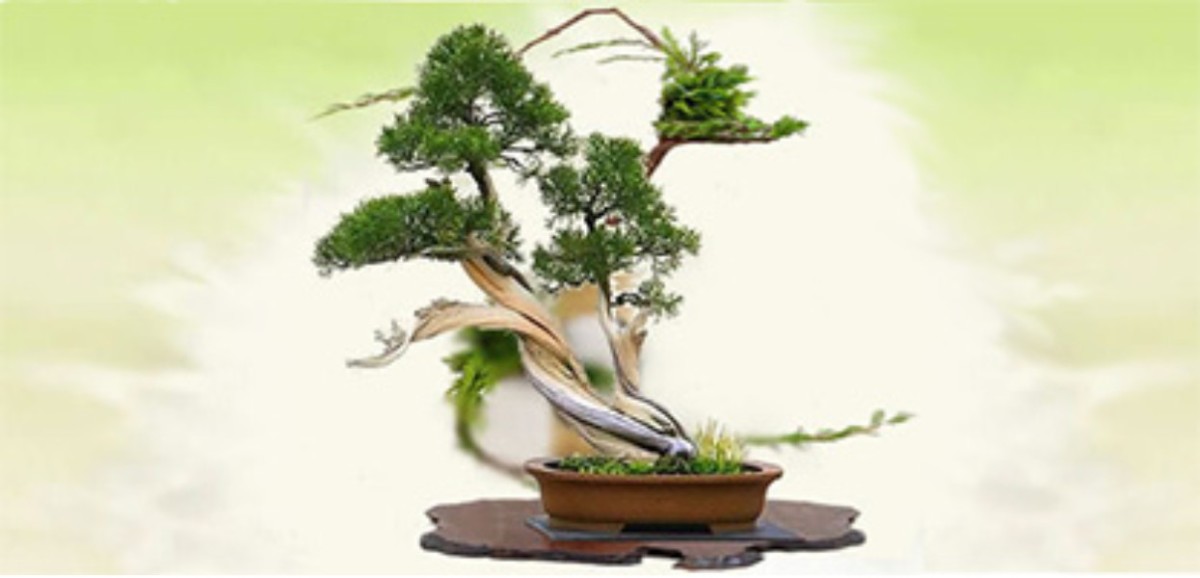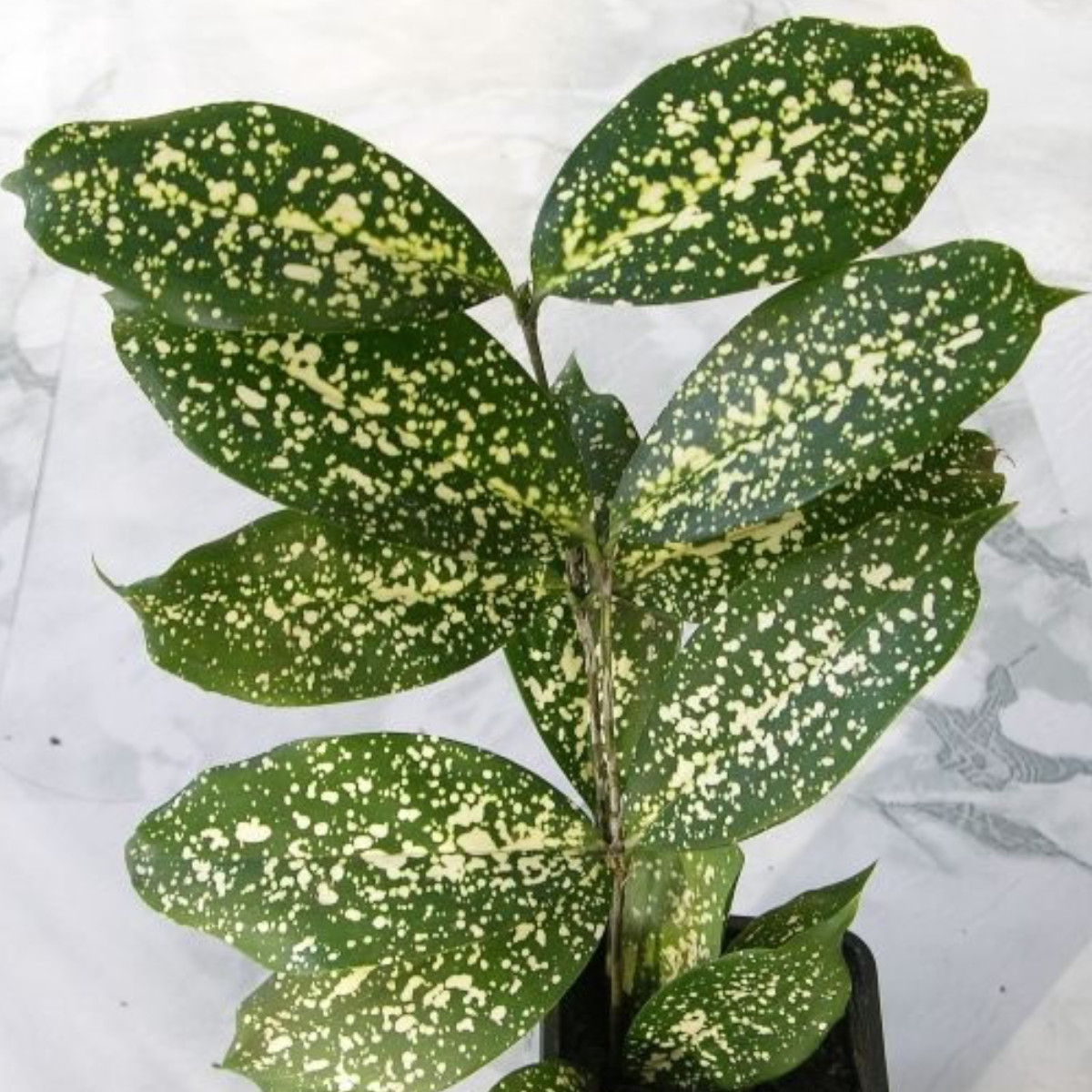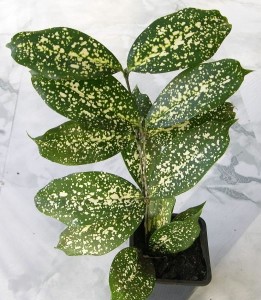Common Names: Golddust Dracaena, Spoted-Leaf Dracaena, Japanese Bamboo, Gold Dust Plant
Family: Asparagaceae
Synonymous: Dracaena godseffiana
Distribution and habitat: Dracaena surculosa is a native of western tropical Africa rainforest region.
Description: Dracaena surculosa is a slow growing, cespitose, evergreen plant, with thin erect stems, winding or hanging at times that grow about 60cm (23 inch) high with a spread of 38cm (15 inch). Branch profusely and bear whorls of two or three opposite, elliptic leaveswith pointed apex, 8cm (3inch) long and 4cm (1.5 inch) wide on thin but wiry stems. The leaves are dark green spotted with cream. New leaves appear as tightly rolled cones, unfurling to show beautiful creamy yellow markings.
The inflorescences are 7-8cm (2.75-3 inch) long with small white flowers, pleasantly fragrant during the night; the fruits are globose berries of about 15 mm of diameter of a reddish orange colour.
Houseplant care: Dracaena surculosa is a small plant that can be grown in a bottle garden, though it is tolerant of drier indoors conditions. The bamboo-like canes, is very hardy and accepts both heavy pruning and neglect.
Remove discolored leaves to keep it tidy. Give them an occasional shower on their foliage to remove dust. A trim along old stems is recommended to rejuvenate growth. Prune erect stems when there are one too many at various desired heights (new growth will readily emerge at cut levels) for a lovely aesthetic and ornamental display.
Light: Dracaena surculosa need bright light, but should not be placed in direct sunlight. Good light will help keeping strong leaves variegation.
Outdoors,Dracaena surculosa can handle a few hours of direct sun, even.
Temperature: For Dracaena surculosa the temperature should be moderate in summer with a minimum of 10C (50F) in winter. Provide the plant with some humidity by standing the pot on a tray with moist pebbles and by mist-spraying occasionally, but avoid over-watering the leaves.
Cooler conditions for only a week or two are not fatal. The growth will be restored as soon as the temperatures rise above 18C.
Water: During the active growth period (from early summer till autumn) water Dracaena surculosa moderately to keep the potting mixture moist, but never sodden. During the rest of the year water it only enough to prevent the compost from drying out.
Fertilising: Give a liquid fertiliser once a fortnight during the summer.
Potting and repotting: Pot on Dracaena surculosa in spring every other year, using a well-drained soil-based potting mixture. Dracaena surculosa remain relatively small and do not need frequent repotting to sustain the growth. It will thrive for years in quite small pots and will attain maturity in 12cm (5 inch) pots. It likes to be potbound, so do not repot it in an over-sized one.
Propagation: Dracaena surculosa can be propagated from tip cuttings taken with three or four leaves attached. Insert the tip cuttings in 8cm (3inch) pots filled with moistened rooting mixture consisting of equal parts peat and sand. Enclose the pots in a plastic bag and keep them in a temperature of 21-24C (70-75F) in partially shaded positions. Alternatively can be used a heated propagator case. No additional water will be needed for four to six weeks.
After rooting has occurred, remove the pot for plastic bag or propagator and begin to water the new plant moderately, moistening the potting mixture at each watering and allowing the top centimetre (0.4 inch) or so of the mixture to dry out before watering again. In addition apply half-strength liquid fertiliser at fortnightly intervals. When roots appear on the surface of the mixture, move the young plant into a pot one size larger containing the standard potting mixture used for adult plants and treat them as mature Dracaena surculosa.
Dracaena surculosa can be also propagated through division when repotting.
Problems:
Stunted growth may be caused by root mealy bugs; check for evidence around the roots.
Treatment: Use an appropriate pesticide. Place granule of a synthetic pesticide in the potting mixture. During the next month examine plants weekly for traces of re-infestation.
Avoid overwatering.
The soil must be draining, in order to avoid rottenness due to water stagnation. If it is placed in a poorly luminous or rather cool position, then it is better to reduce the watering.
Too dark or too sunny positions will usually cause leaf drop.
Recommended varieties:
Dracaena surculosa 'Florida Beauty' has leaves so densely spotted that many of the blotches merge to form a solid creamy white area.
Dracaena surculosa 'Kellery' has ticker leaves.
Uses: Dracaena surculosa is an ideal houseplant for cooler areas where will be thrive in warm spot free from droughts. In warmer areas grow outdoors in a sheltered spot.
It has a stunning variegated foliage that sparkles among a crowd of greeneries.It is ideal as an attractive specimen in homes, offices, shopping malls, etc. as it is tolerant of low light conditions.
Outdoors in the garden, it is suitable as a standalone shrub or mass-planted as a back of border or bedding plant in sunny or semi-shaded sites or used in informal hedges and landscaping. Excellent too for container gardening, located at patio, deck, porch or courtyard as a specimen or with a crowd of other foliage plants. It is simply fabulous for small-sized garden where plants are mostly container-grown.
Its beautiful variegated foliage are popularly used as fillers to add interest, sparkle and beauty in floral arrangements.
Toxicity: The plant and its fruits are poisonous to many animals, including cats and dogs.
SUMMARY:
CHARACTERISTICS:
Foliage variegated
Shape upright
Height: 60cm (23 inch)
PROPER CARE:
Watering in rest period moderately
Watering in active growth period plentifully
Light bright filtered
Temperature in rest period min 18C max 24C (64-75F)
Temperature in active growth period min 18C max 24C (64-75F)
Humidity high
Hardiness zone: 9a-11
Begonia propagation f...
Essential Nutrients f...
Portulacaria afra
Tillandsia recurvata
Tillandsia stricta
Columnea microphylla
Clivia miniata
Cleyera japonica
Clerodendrum thomsoni...
Cleistocactus strausi...



